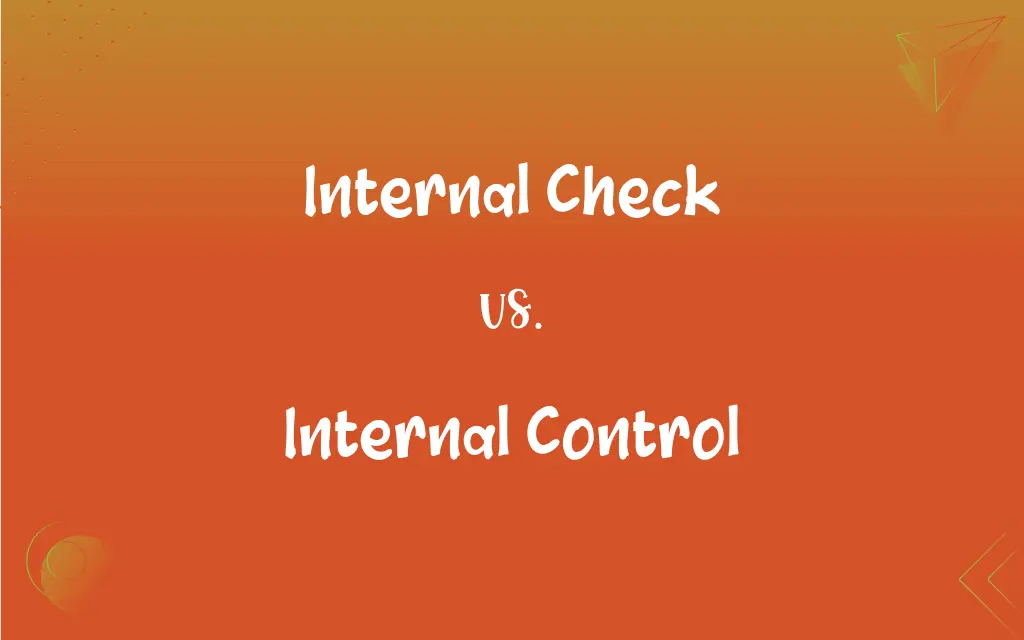Internal Check vs. Internal Control: What's the Difference?
Edited by Aimie Carlson || By Harlon Moss || Published on January 30, 2024
Internal check is a part of internal control, focusing on routine checks and balances, while internal control is a broader system encompassing policies, procedures, and checks to ensure business efficiency, accuracy, and compliance.

Key Differences
Internal check refers to the segregation of duties and routine checks built into daily processes to prevent errors and fraud. Internal control is a comprehensive framework including internal check, risk management, and compliance mechanisms.
The scope of internal check is narrower, targeting specific tasks and transactions for accuracy and validity. Internal control encompasses a wider range of activities including internal check, risk assessment, and setting of corporate policies.
Internal check functions within the operational level, ensuring the correctness of individual transactions. Internal control operates at a strategic level, aligning with the organization's objectives and governance.
Internal check is often seen as the first line of defense in error and fraud prevention. Internal control, however, includes not only preventive measures like internal check but also detective and corrective controls.
Implementation of internal check is typically simpler and more transaction-focused. Internal control requires a broader implementation, involving management oversight, control environment setting, and regular evaluations.
ADVERTISEMENT
Comparison Chart
Scope
Focused on specific transactions and duties
Broad, encompassing overall organizational controls
Function
Prevents errors and fraud in daily operations
Manages risk, ensures compliance, and enhances efficiency
Level of Operation
Operational, dealing with routine processes
Strategic, aligned with organizational goals
Components
Segregation of duties, routine checks
Policies, procedures, risk management, and internal checks
Objective
Immediate error and fraud detection and prevention
Long-term organizational integrity and effectiveness
ADVERTISEMENT
Internal Check and Internal Control Definitions
Internal Check
Internal check is part of daily operations.
Cross-verification of receipts by different employees is an effective internal check.
Internal Control
Internal control encompasses risk management.
Assessing financial risks is part of our internal control process.
Internal Check
Internal check aims at immediate error detection.
Internal check caught the pricing error before the sale was finalized.
Internal Control
Internal control ensures organizational efficiency.
Strong internal controls have streamlined our operations.
Internal Check
Internal check involves routine procedural checks.
The internal check system flagged the unusual transaction for review.
Internal Control
Internal control involves both prevention and correction.
The internal control system not only prevents errors but also corrects them.
Internal Check
Internal check involves segregating duties to prevent fraud.
Internal check prevented a conflict of interest in invoice processing.
Internal Control
Internal control is a system of policies and procedures.
The company's internal control system was audited for compliance.
Internal Check
Internal check ensures transaction accuracy.
Regular reconciliation of accounts is a key internal check.
Internal Control
Internal control includes governance and oversight.
Management plays a crucial role in the internal control framework.
FAQs
What is an internal check?
A routine process within operations to prevent errors and fraud.
What is internal control?
A comprehensive system of policies and procedures for organizational efficiency.
Can internal check work independently?
Yes, as it's a part of daily operational processes.
Is internal control only about financial aspects?
No, it covers all aspects of organizational operations.
Why is internal check important?
For immediate detection and prevention of errors and fraud.
What’s the goal of internal control?
To ensure long-term organizational integrity and effectiveness.
What happens if internal check fails?
It can lead to undetected errors or fraud.
Does internal check require external audit?
Not necessarily, but it can be subject to external review.
How does internal check work?
Through segregation of duties and routine checks in daily tasks.
What are the components of internal control?
Policies, procedures, risk management, and internal checks.
Who oversees internal control?
Management and the board of directors.
How often should internal control be reviewed?
Regularly, to ensure it remains effective and relevant.
Who is responsible for internal check?
Typically, the staff involved in daily operations.
Can internal control change over time?
Yes, it should evolve with organizational and environmental changes.
Can internal control prevent all risks?
No, but it significantly reduces risk exposure.
What is the role of employees in internal check?
Active participation in following and enforcing the checks.
What if internal check conflicts with efficiency?
Balance must be found between control and operational efficiency.
Is training important for internal control?
Yes, employees need to understand their role in the control system.
Are internal checks documented?
Yes, for accountability and review purposes.
Does technology play a role in internal control?
Yes, especially in automating and monitoring control processes.
About Author
Written by
Harlon MossHarlon is a seasoned quality moderator and accomplished content writer for Difference Wiki. An alumnus of the prestigious University of California, he earned his degree in Computer Science. Leveraging his academic background, Harlon brings a meticulous and informed perspective to his work, ensuring content accuracy and excellence.
Edited by
Aimie CarlsonAimie Carlson, holding a master's degree in English literature, is a fervent English language enthusiast. She lends her writing talents to Difference Wiki, a prominent website that specializes in comparisons, offering readers insightful analyses that both captivate and inform.































































